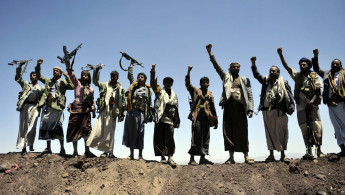Houthi rebels: No peace without consensus president in Yemen
Houthi rebels in Yemen want President Hadi to step aside in place of a caretaker leader to oversee a political transition.
2 min read
Houthis say a president must be agreed on before achieving a peace deal [Getty]
Yemen's Iran-backed rebels said on Wednesday that they would not sign any peace deal without prior agreement on a "consensus president" to lead the transition.
The demand from the Houthi rebels, who control swathes of the country, including the capital, Sanaa, comes a day after the UN envoy said he had proposed a roadmap for peace following two months of negotiations in Kuwait.
The Saudi-backed government of President Abedrabbo Mansour Hadi insists that he is the legitimate president who should lead any transition.
But the rebels said consensus must be reached between the warring parties on all issues to do with transition.
"Foremost among these is the presidency which is at the centre of the negotiations and on which all the other issues, like the formation of a national unity government and a supreme military and security committee, depend," a rebel statement said.
The peace roadmap announced by UN envoy Ismail Ould Cheikh Ahmed calls for the implementation of security arrangements set out in an April 2015 Security Council resolution and the formation of a government of national unity.
Security arrangements under Resolution 2216 require the rebels and their allies to withdraw from areas they have occupied since 2014, including Sanaa, and hand over heavy weapons.
"The delegations have responded positively to the proposals, but have not yet reached agreement on the sequencing of the different steps provided in the roadmap," mainly when the unity government would be formed, Ould Cheikh Ahmed told the Security Council on Tuesday.
The government has resisted proposals for a unity administration before the rebels' withdrawal and handover of arms, fearing it would undermine the international legitimacy of Hadi.
As the peace talks have dragged on in Kuwait, there has been renewed fighting on the ground, despite a UN-brokered ceasefire that took effect on April 11.
On Tuesday, the rebels advanced towards Yemen's biggest airbase - Al-Anad - in heavy fighting that left 18 rebels and six loyalists dead.
The UN envoy expressed "strong indignation" at the rebel advance in a statement early on Wednesday, saying it was a "grave development that could threaten the talks."
More than 6,400 have been killed in Yemen, since a Saudi-led coalition intervened in support of Hadi's government in March last year.
Another 2.8 million people have been displaced and more than 80 percent of the population are in urgent need of humanitarian aid, according to UN figures.





 Follow the Middle East's top stories in English at The New Arab on Google News
Follow the Middle East's top stories in English at The New Arab on Google News

![Israeli forces ordered bombed Gaza's Jabalia, ordering residents to leave [Getty]](/sites/default/files/styles/image_330x185/public/2176418030.jpeg?h=a5f2f23a&itok=_YGZaP1z)
